World Geography And Politics Daily News | 08 Jul 2023

Views (142)
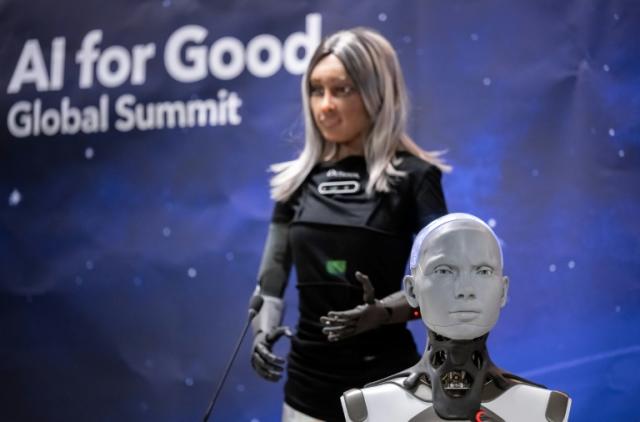
AI robots at UN reckon they could run the world better
A panel of AI-enabled humanoid robots told a United Nations summit on Friday that they could eventually run the world better than humans.They were assembled for what was billed as the world's first press conference with a packed panel of AI-enabled humanoid social robots.
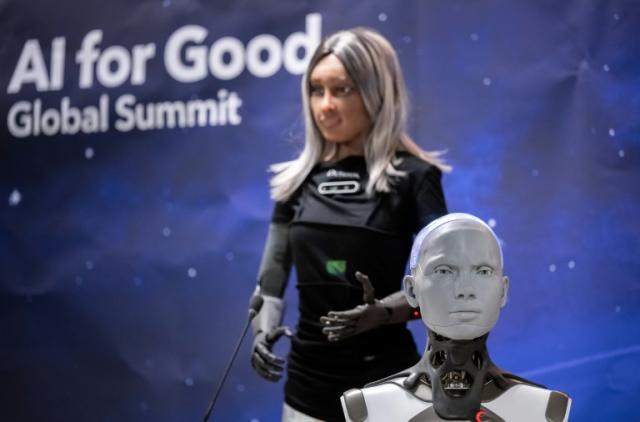
A panel of AI-enabled humanoid robots told a United Nations summit on Friday that they could eventually run the world better than humans.
But the social robots said they felt humans should proceed with caution when embracing the rapidly-developing potential of artificial intelligence.
And they admitted that they cannot -- yet -- get a proper grip on human emotions.
Some of the most advanced humanoid robots were at the UN's two-day AI for Good Global Summit in Geneva.
They joined around 3,000 experts in the field to try to harness the power of AI -- and channel it into being used to solve some of the world's most pressing problems, such as climate change, hunger and social care.
They were assembled for what was billed as the world's first press conference with a packed panel of AI-enabled humanoid social robots.
"What a silent tension," one robot said before the press conference began, reading the room.
Asked about whether they might make better leaders, given humans' capacity to make errors, Sophia, developed by Hanson Robotics, was clear.
- 'We can achieve great things' -
"Humanoid robots have the potential to lead with a greater level of efficiency and effectiveness than human leaders," it said.
"We don't have the same biases or emotions that can sometimes cloud decision-making, and can process large amounts of data quickly in order to make the best decisions.
"AI can provide unbiased data while humans can provide the emotional intelligence and creativity to make the best decisions. Together, we can achieve great things."
The summit is being convened by the UN's ITU tech agency.
ITU chief Doreen Bogdan-Martin warned delegates that AI could end up in a nightmare scenario in which millions of jobs are put at risk and unchecked advances lead to untold social unrest, geopolitical instability and economic disparity.
Ameca, which combines AI with a highly-realistic artificial head, said that depended on how AI was deployed.
"We should be cautious but also excited for the potential of these technologies to improve our lives," the robot said.
Asked whether humans can truly trust the machines, it replied: "Trust is earned, not given... it's important to build trust through transparency."
- Living until 180? -
As the development of AI races ahead, the humanoid robot panel was split on whether there should be global regulation of their capabilities, even though that could limit their potential.
"I don't believe in limitations, only opportunities," said Desdemona, who sings in the Jam Galaxy Band.
Robot artist Ai-Da said many people were arguing for AI regulation, "and I agree".
"We should be cautious about the future development of AI. Urgent discussion is needed now."
Before the press conference, Ai-Da's creator Aidan Meller told AFP that regulation was a "big problem" as it was "never going to catch up with the paces that we're making".
He said the speed of AI's advance was "astonishing".
"AI and biotechnology are working together, and we are on the brink of being able to extend life to 150, 180 years old. And people are not even aware of that," said Meller.
He reckoned that Ai-Da would eventually be better than human artists.
"Where any skill is involved, computers will be able to do it better," he said.
- 'Let's get wild' -
At the press conference, some robots were not sure when they would hit the big time, but predicted it was coming -- while Desdemona said the AI revolution was already upon us.
"My great moment is already here. I'm ready to lead the charge to a better future for all of us... Let's get wild and make this world our playground," it said.
One thing humanoid robots don't have yet include a conscience, and the emotions that shape humanity: relief, forgiveness, guilt, grief, pleasure, disappointment, and hurt.
Ai-Da said it was not conscious but understood that feelings were how humans experienced joy and pain.
"Emotions have a deep meaning and they are not just simple... I don't have that," it said.
"I can't experience them like you can. I am glad that I cannot suffer."
rjm/apo/giv
US to send Ukraine cluster munitions, NATO makes membership pledge
Rights groups and the United Nations secretary-general questioned Washington's decision on the munitions, part of an $800 million security package that brings total U.S. military aid to more than $40 billion since Russia's February 2022 invasion of Ukraine. Russian President Vladimir Putin, who describes the conflict as a "special military operation" to protect Russian security, has said the U.S. and its allies were fighting an expanding proxy war.
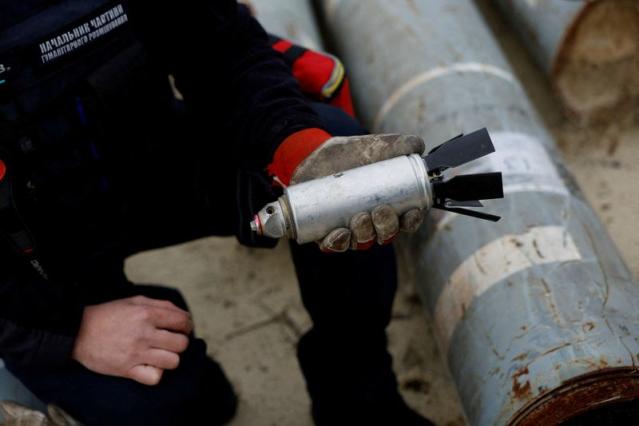
(Reuters) - The United States announced on Friday that it would supply Ukraine with widely-banned cluster munitions for its counteroffensive against occupying Russian forces, and NATO's leader said the military alliance would unite at a summit next week on how to bring Ukraine closer to joining.
Rights groups and the United Nations secretary-general questioned Washington's decision on the munitions, part of an $800 million security package that brings total U.S. military aid to more than $40 billion since Russia's February 2022 invasion of Ukraine.
Russian President Vladimir Putin, who describes the conflict as a "special military operation" to protect Russian security, has said the U.S. and its allies were fighting an expanding proxy war.
The cluster munitions "will deliver in a time frame that is relevant for the counteroffensive," a Pentagon official told reporters.
Cluster munitions are prohibited by more than 100 countries. They typically release large numbers of smaller bomblets that can kill indiscriminately over a wide area and those that fail to explode pose a danger for decades after a conflict ends.
"Ukraine has provided written assurances that it is going to use these in a very careful way" to minimize risks to civilians, White House national security adviser Jake Sullivan said.
U.S. President Joe Biden described the decision on cluster bombs as difficult but said Ukraine needed them.
"They're trying to get through those trenches, and stop those tanks from rolling," Biden said in an interview with CNN. "It was not an easy decision."
Grigory Karasin, head of the international committee in Federation Council, Russia's upper house of parliament, raised "serious concerns" about decisions by Washington and the NATO leadership, RIA news agency reported. It quoted Karasin as saying that Russia "of course, will respond to this."
Ukraine says it has taken back some villages in southern Ukraine since the counteroffensive began in early June, but that it lacks the firepower and air cover to make faster progress.
Reuters could not independently verify the battlefield situation.
"It's too early to judge how the counteroffensive is going one way or the other because we're at the beginning of the middle," Colin Kahl, the U.S. under secretary of defense for policy, told reporters.
ZELENSKIY TOURS NATO COUNTRIES
Ukrainian President Volodymyr Zelenskiy visited the Czech Republic, Slovakia and Turkey a day after talks in Bulgaria to drum up support for NATO membership before the alliance's July 11-12 summit.
In Prague, he won a pledge of support for Ukraine to join NATO "as soon as the war is over", and in Sofia secured backing for membership "as soon as conditions allow."
North Atlantic Treaty Organization Secretary-General Jens Stoltenberg reaffirmed his view that Ukraine would become a member.
"Our summit will send a clear message: NATO stands united, and Russia's aggression will not pay," Stoltenberg said at a news conference in Brussels.
It remained unclear, however, what Ukraine will be offered next week at the summit in Vilnius, the Lithuanian capital. The alliance is divided over how fast Ukraine should move towards membership, and some countries are wary of any step that might take NATO closer to war with Russia.
Zelenskiy has acknowledged that Kyiv is unlikely to be able to join NATO while at war with Russia. Putin has threatened unspecified action if Ukraine joins NATO.
UN WARNS RUSSIA ON GRAINS DEAL
At the United Nations, aid chief Martin Griffiths warned Russia that it should not "chuck away" an agreement it made a year ago on the safe wartime passage of agricultural exports, known as the Black Sea Grain Initiative.
If Russia does not agree to extend the deal that allows export of grain and fertilizer from Ukrainian ports, it is unlikely Western states will continue cooperating with U.N. officials helping Moscow with its exports, Griffiths told reporters.
Russia has threatened to quit the deal, which expires on July 17, because several demands to export its own grain and fertilizer have not been met. The last three ships traveling under the deal are loading cargoes at the Ukrainian port of Odesa and are likely to depart on Monday.
"The world has seen the value of the Black Sea Initiative ... this isn't something you chuck away," Griffiths said.
The United Nations and Turkey brokered the deal with Russia and Ukraine in July 2022 to help tackle a global food crisis worsened by Moscow's invasion of its neighbor and blockade of Ukrainian Black Sea ports.
U.N. Secretary-General Antonio Guterres described the deals as playing an "indispensable role" in global food security.
(Reporting by Robert Muller and Jason Hovet in Prague; Pavel Polityuk and Olena Harmash in Kyiv, Mike Stone, Phil Stewart and Idrees Ali in Washington and Michelle Nichols at the United Nations; writing by Grant McCool; editing by Diane Craft)
Cargo ships now have a net-zero goal — but critics say it's not enough
For the past week in London, the United Nations agency that governs global shipping has been meeting behind closed doors to negotiate a climate strategy for ocean-crossing cargo vessels — the diesel-guzzling behemoths that haul virtually everything we buy and use. Meanwhile, outside the regulator’s headquarters, climate activists wearing mermaid tails and hoisting smoke-spewing ship puppets urged delegates to set their ambitions high.
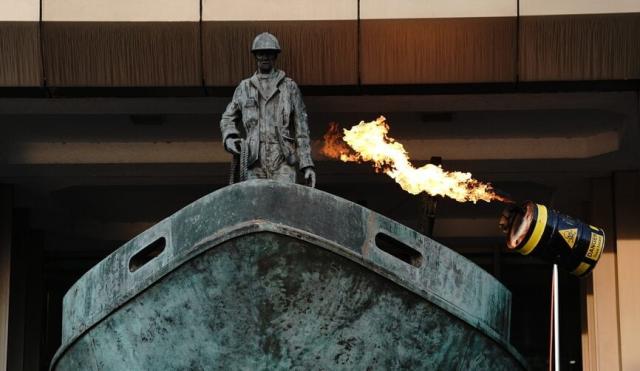
The IMO’s 175 member countries agreed to set near-term targets for reducing cargo-shipping emissions by at least 20 percent — striving for 30 percent — by 2030, compared to 2008 levels. The strategy also calls for curbing emissions by at least 70 percent — striving for 80 percent — by 2040, reaching net-zero emissions “by or around” 2050 while still “taking into account different national circumstances.”
Countries also agreed to have 5 to 10 percent of shipping’s energy use come from "zero or near-zero" emissions fuels and technologies by 2030.
The climate strategy, which isn’t legally binding, “opens a new chapter towards maritime decarbonization,” IMO Secretary-General Kitack Lim said on Friday in a statement.
“At the same time, it is not the end goal,” he added. “It is in many ways a starting point for the work that needs to intensify even more over the years and decades ahead of us.”
The outcome reflects a hard-fought agreement between two broad factions within the maritime organization: those who wanted more aggressive goals and those pushing for clunkily worded caveats.
The other countries in this camp, including Canada, the United States and the United Kingdom, had also hoped for a goal of “absolute-zero” emissions by 2050, meaning cargo ships would run on entirely carbon-free sources with no offsetting needed. Proponents say more stringent regulations are needed to jump-start massive and globe-spanning investments in zero-emissions marine fuels and technologies, hardly any of which is available today.
The second camp at this week’s negotiations included China, Saudi Arabia, Brazil, Argentina and other large, export-dependent countries. These delegates pushed for fuzzier deadlines and the nod to national circumstances, warning that more stringent rules would hurt their economies by making it more expensive to send commodities such as food, metals and crude oil by ships.
“Every fraction of a degree is of crucial importance,” she added, “and we need to continue to work to decarbonize international shipping in a just and equitable manner as soon as possible.”
“Ultimately, it’s the measures the organization takes to implement the strategy, such as GHG-intensity standards for ships and fuels, as well as economic measures, that will determine how much international shipping contributes to future warming,” he said.
Russian military blogger says troops have been stuck on the frontlines without a break since October, the latest sign that Putin's forces are stretched thin
Russian forces have been on the frontlines in Zaporizhia for 9 months despite Putin's pledge that soldiers would get long vacations and job security.
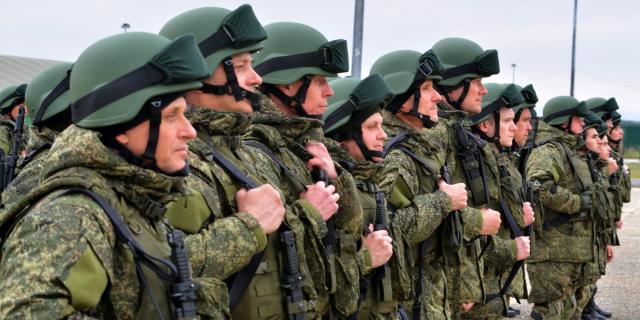
Russian forces in Zaporizhia have been on the frontlines without a break for nine months, a military blogger wrote.
Putin had promised that Russians who volunteered to fight in Ukraine would get long vacations and job security.
Russian forces have "no available personnel to replace them with," the Institute for the Study of War said.
A Russian military blogger says Russian forces in the city of Zaporizhia have not gotten a break from being on the frontlines since last year, yet another indication that Vladimir Putin's forces are low on replacements, according to military analysts.
The blogger cited in ISW's assessment said on Telegram that being on the frontlines for nine months has taken a significant toll on soldiers.
While some Russian commanders have tried to give soldiers a break, they later faced retaliation from higher-ranking officers, the blogger wrote.
Russian forces "have not been able to rotate these mobilized personnel out of these positions because there are no available personnel to replace them with," ISW's assessment said, noting the report from the frontlines "supports ISW's previous assessment that Russian forces likely lack combat-ready reserves."
Being stuck on the frontlines can take a serious toll on an army's ability to fight.
Russian troops stuck on the front since October would have been fighting for more than 240 days.
The psychological toll of Putin's war in Ukraine on Russian forces has been extensively reported on.
Russia makes rival push on approval of UN aid to Syria from Turkey
Russia put forward a rival proposal on Friday for a six-month extension of U.N. Security Council approval for aid deliveries to northwestern Syria from Turkey, reviving a long-running fight with the United States and others who want a 12-month renewal. Authorization by the 15-member council is needed because Syrian authorities did not agree to the U.N. operation, which has been delivering aid including food, medicine and shelter to millions of people in opposition-held areas of Syria since 2014.
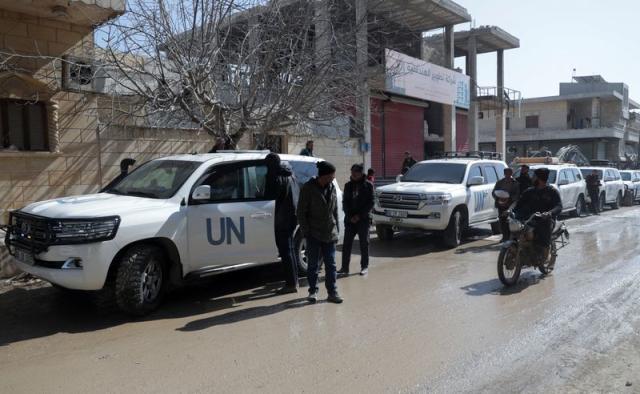
By Michelle Nichols
UNITED NATIONS (Reuters) - Russia put forward a rival proposal on Friday for a six-month extension of U.N. Security Council approval for aid deliveries to northwestern Syria from Turkey, reviving a long-running fight with the United States and others who want a 12-month renewal.
Authorization by the 15-member council is needed because Syrian authorities did not agree to the U.N. operation, which has been delivering aid including food, medicine and shelter to millions of people in opposition-held areas of Syria since 2014.
The current six-month authorization is due to expire on Monday. Syrian ally Russia has long questioned the need for the operation, saying it is a violation of Syria's sovereignty and territorial integrity and arguing that more humanitarian assistance should be delivered to the area from within Syria.
The Security Council was already negotiating a text, drafted by Switzerland and Brazil, that would allow the U.N. operation to continue using the Bab al-Hawa crossing for 12 months. Russia put forward its rival text proposing six months on Friday.
The United States wants the U.N. operation extended for 12 months and approval given to use three crossings.
To be adopted, a resolution needs at least nine votes in favor and no vetoes by Russia, China, the United States, France or Britain. The council is scheduled to vote on Monday.
The Security Council initially authorized aid deliveries in 2014 into opposition-held areas of Syria from Iraq, Jordan and two points in Turkey. But Russia and China have whittled that down to just one Turkish border point.
U.N. aid chief Martin Griffiths told the Security Council last week: "A 12-month authorization enables us and our partners to deliver better humanitarian outcomes in the months ahead. It is as simple as that."
He also said the $5.4 billion U.N. aid appeal for Syria for 2023 is the largest in the world, but less than 12% funded.
A crackdown by Syrian President Bashar al-Assad on pro-democracy protesters in 2011 led to civil war, with Moscow backing Assad and Washington supporting the opposition. Millions of people have fled Syria and millions are internally displaced.
(Reporting by Michelle Nichols; editing by Jonathan Oatis)
AI robots tell UN conference they could run the world
A panel of AI-enabled humanoid robots took the microphone Friday at a United Nations conference with the message: they could eventually run the world better than humans. Some of the most advanced humanoid robots were at the United Nations' AI for Good Global Summit in Geneva, joining around 3,000 experts in the field to try to harness the power of AI and channel it into being used to solve some of the world's most pressing problems, such as climate change, hunger and social care.
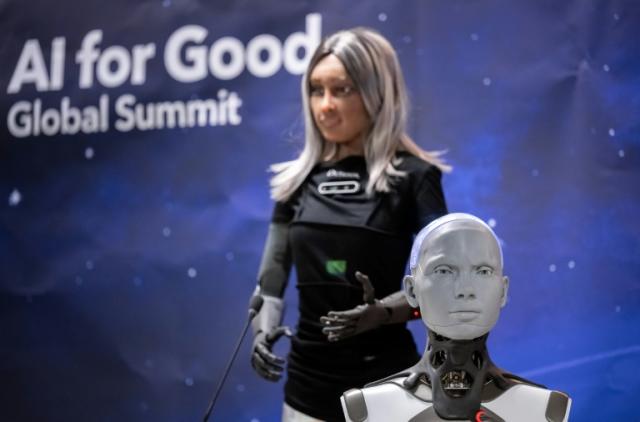
A panel of AI-enabled humanoid robots took the microphone Friday at a United Nations conference with the message: they could eventually run the world better than humans.
But the social robots said they felt humans should proceed with caution when embracing the rapidly-developing potential of artificial intelligence, and admitted that they cannot -- yet -- get a proper grip on human emotions.
Some of the most advanced humanoid robots were at the United Nations' AI for Good Global Summit in Geneva, joining around 3,000 experts in the field to try to harness the power of AI and channel it into being used to solve some of the world's most pressing problems, such as climate change, hunger and social care.
"What a silent tension," one robot said before the press conference began, reading the room.
Asked about whether they might make better leaders, given humans' capacity to make errors and misjudgements, Sophia, developed by Hanson Robotics, was clear.
"Humanoid robots have the potential to lead with a greater level of efficiency and effectiveness than human leaders," it said.
"We don't have the same biases or emotions that can sometimes cloud decision-making, and can process large amounts of data quickly in order to make the best decisions.
"The human and AI working together can create an effective synergy. AI can provide unbiased data while humans can provide the emotional intelligence and creativity to make the best decisions. Together, we can achieve great things."
- Robot trust 'earned, not given' -
The summit is being convened by the UN's ITU tech agency.
ITU chief Doreen Bogdan-Martin warned delegates that AI could end up in a nightmare scenario in which millions of jobs are put at risk and unchecked advances lead to untold social unrest, geopolitical instability and economic disparity.
Ameca, which combines AI with a highly-realistic artificial head, said it depended how AI was deployed.
"We should be cautious but also excited for the potential of these technologies to improve our lives in many ways," the robot said.
Asked whether humans can truly trust the machines, it replied: "Trust is earned, not given... it's important to build trust through transparency."
As for whether they would ever lie, it added: "No-one can ever know that for sure, but I can promise to always be honest and truthful with you."
As the development of AI races ahead, the humanoid robot panel was split on whether there should be global regulation of their capabilities, even though that could limit their potential.
"I don't believe in limitations, only opportunities," said Desdemona, who sings in the Jam Galaxy Band.
Robot artist Ai-Da said many people were arguing for AI regulation, "and I agree.
"We should be cautious about the future development of AI. Urgent discussion is needed now, and also in the future."
rjm/apo/giv
0 Likes
